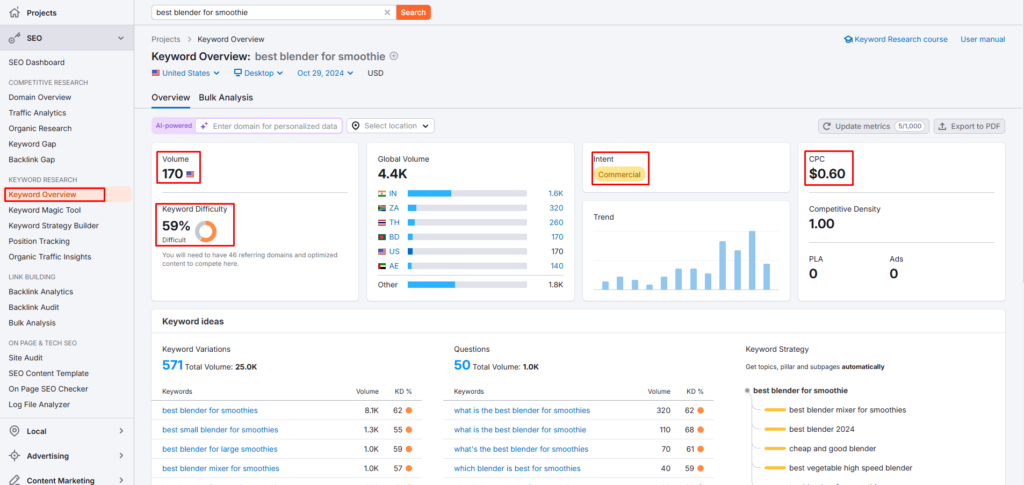In the rapidly changing world of affiliate marketing, staying competitive means honing in on one critical skill: keyword research for affiliate marketing. This skill forms the foundation of a successful affiliate strategy by helping marketers understand what their audience is searching for and how to target these potential customers effectively. By identifying the right keywords, affiliates can not only attract highly-targeted traffic but also boost conversions, making keyword research an essential part of profitable affiliate marketing.
Successful keyword research for affiliate marketing goes beyond simply finding high-volume search terms; it involves selecting keywords that match user intent and analyzing the competition to ensure they’re achievable. In this guide, I’ll walk you through essential techniques and tools such as SEMrush, Ahrefs, Ubersuggest, and Moz to master the art of keyword research. From identifying underserved content opportunities on Google’s first page to evaluating competitor authority scores, you’ll discover how to create a comprehensive keyword strategy for optimal affiliate performance. Whether you’re an experienced affiliate or just starting, this guide will equip you with actionable insights to excel in a competitive marketplace.
Understanding Keywords and Their Importance in Affiliate Marketing
To create content that attracts and converts, affiliate marketers need to understand the basics of keywords and the value of thorough research.
What Are Keywords?
Keywords are the phrases or terms users type into search engines to find specific information. They’re categorized into short-tail keywords (one to two words) and long-tail keywords (three words or more), each serving different search intents. For example, “best running shoes” is a short-tail keyword with broad intent, while “best running shoes for flat feet” is a long-tail keyword with a more specific search intent.
Why Keyword Research Is important for Affiliate Marketing
Effective keyword research can be the difference between an affiliate site that performs well and one that doesn’t. By identifying keywords with a balance of search volume and achievable competition, affiliates can target terms that attract interested buyers, increase traffic, and ultimately drive sales.
Finding Profitable Keywords for Affiliate Marketing
Before you dive into creating content, it’s essential to start with a solid keyword list. Here’s how to find profitable keywords tailored to your affiliate niche.
Start with Seed Keywords
Begin with a list of seed keywords—these are the core topics or ideas directly related to the products you’re promoting. For instance, if you’re promoting kitchen gadgets, seed keywords could be “best blenders” or “top food processors.” These initial ideas will help you expand into a broader list of related keywords.
Determine Profitability with Metrics
Focus on metrics like search volume, cost-per-click (CPC), and commercial intent to identify keywords that can drive profitable traffic. For example, keywords with high CPC often indicate a high commercial intent, suggesting users are more likely to make a purchase.
Essential Tools for Keyword Research in Affiliate Marketing
Several tools can assist in pinpointing high-value keywords while providing insights into competition, search volume, and more. Here’s a list of top tools:
- SEMrush: Known for its powerful keyword analysis features, SEMrush also provides competitor insights and data on keyword difficulty, making it a go-to for detailed research.
- Ahrefs: Offers keyword research, backlink analysis, and insights into competitors, which is essential for understanding ranking potential.
- Ubersuggest: An easy-to-use tool that provides keyword suggestions, search volume, and SEO difficulty—ideal for beginners and advanced users alike.
- Moz: Known for accurate data on keyword difficulty, search volume, and SERP analysis, Moz helps you pinpoint opportunities in competitive niches.
- Keywords Everywhere: A convenient browser extension that displays search volume, CPC, and competition levels directly on search engine results pages, making it easy to collect keyword data on the go.
By leveraging these tools, you can enhance your approach to keyword research for affiliate marketing and find terms that align with your niche and audience demand.
Understanding Search Intent for Better Keyword Targeting
Aligning your keywords with user intent is key to engaging your audience and converting traffic into sales.
Types of Search Intent
- Informational: Keywords where users seek information (e.g., “how to clean a blender”).
- Navigational: Keywords where users want to visit a specific site (e.g., “Amazon blenders”).
- Transactional: Keywords signaling an intent to purchase (e.g., “buy best blender”).
- Commercial Investigation: Keywords where users are researching before a purchase (e.g., “best affordable blenders”)
Tips for Matching Content with Intent
Ensure your content answers the intent behind each keyword. For example, if users are searching “best budget laptops,” create a detailed comparison listicle instead of a technical product description. Meeting user intent builds trust, improving your affiliate site’s engagement metrics.
Competitor Analysis: Finding Under-Served Content Opportunities
Competitor analysis can reveal keywords with untapped potential, helping you create content that fills a gap in the market.
-
Identify Under-Served Topics on Google’s First Page
Analyze the top-ranking content to see where competitors fall short—are there questions they’re not answering or details they’ve overlooked? By identifying these gaps, you can create content that stands out and attracts organic traffic.
-
Look for Forum or Social Media Keywords
Forums, social media platforms, and e-commerce sites are valuable sources of user-generated content (UGC) where real customers discuss pain points. Search for common questions on sites like Quora or Reddit, and include these as keywords or subtopics in your content.
-
Spotting Opportunities with Low-Authority Competitors
Newer or low-authority sites that rank well for a keyword can signal an achievable target.
-
Identify New Sites or Sites with Low Authority
Spotting newer sites with fewer indexed pages on the top 10 can be an indicator that your content has a chance to compete. Tools like Ahrefs and Moz allow you to check Domain Rating (DR), URL Rating (UR), Page Authority (PA), and Domain Authority (DA). Lower authority scores mean less competition, increasing your chance to rank.
-
Evaluating Backlink Profiles and Link Requirements
Analyzing competitor backlink profiles can help determine the number of links you’ll need to compete for a keyword.
- Low Link Count
Check if the top-ranking pages have a limited backlink profile. If so, your content may be able to rank with minimal link-building effort, a key advantage for new affiliate sites.
Practical Tips for Implementing Keywords in Affiliate Content
Well-implemented keywords can help affiliate content rank better while providing value to readers.
-
On-Page SEO Best Practices
Place keywords naturally in titles, headers, descriptions, and alt tags. Use synonyms and variations to avoid over-optimization while keeping the content readable.
-
Create High-Quality Content
Focus on providing solutions to the reader’s queries. Answering their questions thoroughly establishes authority and encourages engagement.
Final Thought
Mastering keyword research for affiliate marketing is essential for anyone looking to build a sustainable, profitable affiliate business. As I’ve seen, keyword research isn’t just about finding high-traffic terms; it’s a multifaceted strategy that involves identifying user intent, analyzing competitor weaknesses, and leveraging tools like SEMrush, Ahrefs, and Moz to inform your content direction.
To stay competitive, you’ll need to monitor your keywords and adapt to the ever-evolving search landscape. SEO is dynamic, and as consumer behavior changes, so should your keyword research approach. Regularly revisit your keyword list, assess search trends, and explore emerging keywords in your niche. Remember, a balanced keyword strategy—one that aligns with user intent and leverages unique content gaps—can position your affiliate content as a valuable resource for readers.
As you implement these techniques, keep the needs of your audience first, creating content that’s both informative and actionable. By approaching keyword research with an intent to solve user problems, you can enhance the authority of your affiliate site, engage more readers, and drive consistent conversions, setting a strong foundation for affiliate success.


